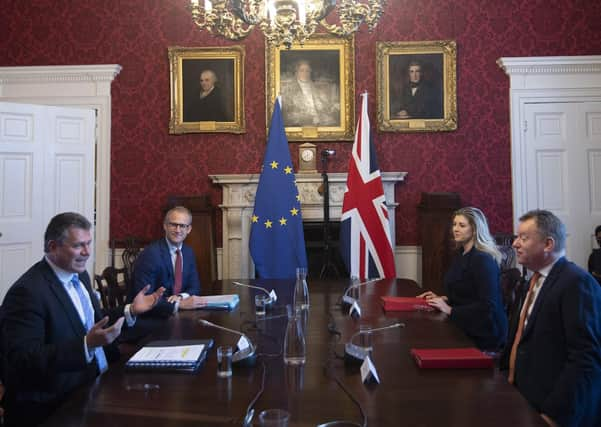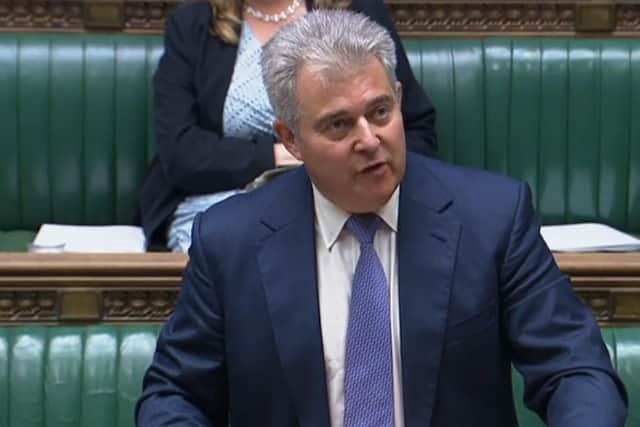Esmond Birnie: The Irish Sea border is costing Northern Ireland £850m a year


In that Paper the Brexit Minister Lord Frost and the NI Secretary of State conceded that, whatever the original intent of the initial agreement with the EU in late 2019, the actual operation of the protocol had been extremely damaging to NI in terms of higher business costs, disrupted supply chains and less choice to consumer.
What the Command Paper did not really do was attempt to quantify the scale of those costs to the NI economy.
Advertisement
Hide AdAdvertisement
Hide AdWhat I do in this article is bring together data relating to four businesses which operate in NI.


On the basis of that data together from some sectoral level data it is possible to present an estimate that the implication of the protocol is that business in NI faced a 6% (possibly more) increase in the cost of bringing goods into NI from GB (see below an appendix for the detail regarding these estimates).
Given that the total flow of goods and materials coming into NI from GB is about £10bn the rise in costs is equivalent to a bill of about £600m annually.
Of course, it is not inevitable, that a £600m increase in costs will lead to an identical decline in NI’s total output and income (its GDP). Businesses and consumers could respond and adapt in various ways although it is likely that many of those changes in behaviour will themselves involve costs and so lead to output and income declining.
Advertisement
Hide AdAdvertisement
Hide AdWhat is probable is that there will be a substantial protocol penalty in terms of lower output and less jobs and so the £600m could be a reasonable first approximation for the impact on NI GDP.


Given the scale of the cost increase on goods coming in from GB and the size of that trade flow pre-2021 we cannot be confident that even if the protocol leads to greater NI trade with the protocol this will adequately compensate for the costs which have been imposed.
And this is not the end of the story, as the UK Command Paper recognised, implementation of the protocol has required a major increase in UK public expenditure of the order of £560m over 2021 and 2022: on the Trader Support Service, the Digital Assistance Scheme and checks at NI ports. So, that is about £250m in each year which cannot now be spent on health, education etc (what economists call the opportunity cost).
Taking the public and private sectors together this is an estimated annual cost of about £850m.
Advertisement
Hide AdAdvertisement
Hide AdIf we had better and more comprehensive data the estimate might be lower but it might also turn out higher.
For sure we are talking about a considerable cost and one approximating to about 2% of NI’s annual GDP — a cost of that magnitude is not dissimilar to some of the estimates of the scale of impact of monopolies in the UK economy and, of course, the UK government dedicates considerable effort and resources in the attempt to remove or reduce monopolies.
There is an argument coming from some parts of the business community that the key thing is policy continuity: now that we’ve got the protocol we should make the most of it rather than introduce further uncertainties for business by chopping and changing.
Whilst there is a certain logic in such claims I cannot see the merit in being consistent in maintaining what is a bad deal from the point of view of NI businesses.
Advertisement
Hide AdAdvertisement
Hide AdThe UK government in its Command Paper concludes that the protocol is no longer sustainable in either economic or political terms. Given that, the principles they outline relating to major reform should be given a fair wind, especially by the EU.
• Dr Esmond Birnie, Senior Economist Ulster University Business School
• Appendix
Four case studies illustrating how the costs of inputs brought in from GB have been increased by the Protocol
Case study / % increase in cost of goods brought in from GB / Summary of method of estimation
Advertisement
Hide AdAdvertisement
Hide Ad1. Marks and Spencer in NI / About 6% /The Marks and Spencer Accounts in 2021 stated about £30m of extra costs relating to Brexit in their NI and RoI operations. I estimated total company turnover in NI plus RoI to be about £750m. Applied the cost of material inputs/turnover figure for NI (from ONS) and then took 90% of this on the assumption that 90% of inputs would be from GB.*
2. Allen Logistics /Up to 6-7% and possibly more / This logistic firm told the BBC that “dispatch costs” (unclear if this the total of Protocol costs) were £50-£350 per pallet where the transport costs of such a pallet normally £50. Used an industry wide estimate that transport costs normally 1-2% of turnover (hence a slightly higher % of total material input costs).**
3. A medium sized business / About 3% in the first year but probably declining to 0.7% in each subsequent year / An example quoted to the House of Lords Sub-Committee. Once off use of trade advisor £130,000 and £3,000 of extra staffing per month (latter assumed ongoing). Also assuming the business’ annual input of material inputs from GB £5m (consistent with a turnover of > £5m but < £10m).***
4. Another business / Up to 20% / Second example quoted to the House of Lords Sub-Committee. Described as the increase in “cost of main product”. This, of course, does not have to mean the total costs of all material inputs from GB increased by 20% though it could mean that.***
Additional note on Sources:
Advertisement
Hide AdAdvertisement
Hide Ad*Marks and Spencer turnover in RoI euros 469m (online “Irish Times Top 1000”, accessed 3 June 2021). For turnover in NI first estimated total UK shop based turnover (i.e. the total turnover quoted in the 2021 Accounts minus online and international, so £9.2bn minus £1.5bn and minus £0.7bn). Then estimated NI from its share of UK sales staff, i.e. 2,800 divided by 56,500 (latter had been about 60,000 at start of 2020 but reduced by 7,000 in the autumn) (employment figures from BBC reports in August 2020 and Belfast Telegraph in April 2021). The cost of material inputs/turnover % for the whole of retail in NI came from ONS May 2020, “Non-Financial Business Economy (Annual Business Survey). We have estimated the Brexit/Protocol increase in costs for GB sourced inputs for the whole of Marks and Spencer in NI and RoI- it is of course possible that the % effects in NI and RoI would differ.
** BBC (news website) “Brexit: Counting the cost of the Irish Sea Border”, 1 April 2021 gives the following summary of the Protocol experience of this haulage firm:
(i.) “Hours (spent) on the phone”. (ii.) Extra 4 hours admin. at dispatch stage re. each pallet of goods. (iii.) £50-350 of extra cost per pallet at dispatch stage (which previously had a transport cost of £100). (iv.) Then, additionally, extra 1-2 hours at NI port.
Item (iii.) likely to “capture” item (ii.) but we are also assuming includes items (i.) and (iv.), which it may not. If we assume (probably not unreasonable given some admittedly rather old data on NI businesses costs alongside more up to date information based on USA experience: Globaltranz.com, 9 June 2014; Bain and Company, 11 September 2018) that in a typical NI company transport costs would normally be about 2% of the total turnover/cost of goods brought in from GB, then the Protocol related costs (based on the Allen Logistics’ experience) are up to 6-7% of those costs but more if items (i.) and (iv.) not included.
Advertisement
Hide AdAdvertisement
Hide Ad***: Para 86 from House of Lords 29 July 2021, “Report of the Sub-Committee on the Protocol in Northern Ireland/Ireland: Introductory Report”.
——— ———
A message from the Editor:
Thank you for reading this story on our website. While I have your attention, I also have an important request to make of you.
With the coronavirus lockdown having a major impact on many of our advertisers — and consequently the revenue we receive — we are more reliant than ever on you taking out a digital subscription.
Subscribe to newsletter.co.uk and enjoy unlimited access to the best Northern Ireland and UK news and information online and on our app. With a digital subscription, you can read more than 5 articles, see fewer ads, enjoy faster load times, and get access to exclusive newsletters and content. Visit https://www.newsletter.co.uk/subscriptions now to sign up.
Advertisement
Hide AdAdvertisement
Hide AdOur journalism costs money and we rely on advertising, print and digital revenues to help to support them. By supporting us, we are able to support you in providing trusted, fact-checked content for this website.
Ben Lowry
Acting Editor